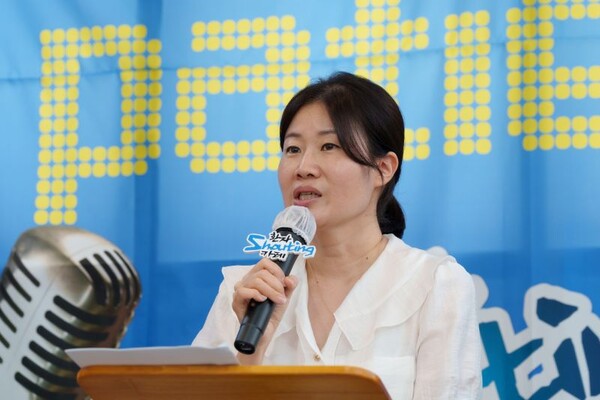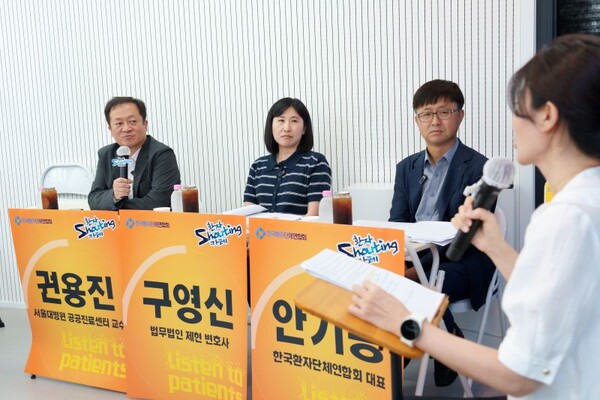Kim Joo-hee, a first-year high school student suffering from the rare disease “Distal 10q trisomy syndrome,” fell into a vegetative state last year due to a medical accident. However, the hospital has been leaving Joo-hee and her family into medical limbo without providing any explanation or apology for the medical accident, prompting calls for societal attention.
The Korean Alliance of Patient Organizations held its 26th Patient Shouting Cafe on Thursday, highlighting the case of Kim Joo-hee, who suffered hypoxic brain damage due to cardiac arrest during a reintubation attempt in the intensive care unit on Dec. 10, 2024, and has been in a vegetative state in the intensive care unit for eight months.

According to Ryu Seon, Kim Joo-hee's mother, Joo-hee was born at 36 weeks' gestation, weighing 1.8 kg, and spent an additional month in an incubator before being discharged. Despite being diagnosed with “Distal 10q trisomy syndrome” at birth, which caused severe intellectual disabilities and scoliosis, Joo-hee was a lovable girl who never lost her smile. As she grew taller during middle school, her scoliosis worsened, and on Nov. 26 last year, she underwent scoliosis correction surgery at an orthopedic department of a tertiary general hospital in Seoul.
However, on Nov. 30, immediately after the surgery, Joo-hee developed severe pneumonia and was transferred to the intensive care unit, where she underwent intubation. The incident occurred 10 days later on Dec. 10, 2024. The physical restraint device securing her wrists to the bedrail was not properly managed, allowing Joo-hee to remove the endotracheal tube on her own. Joo-hee had a long, narrow, and curved airway structure due to Distal 10q trisomy syndrome, which was documented in the surgical records, otolaryngology consultation records, and intensive care unit medical records.
However, the on-duty doctor in the ICU at the time of the accident did not confirm this. Additionally, despite a request for otolaryngology consultation for tracheostomy having been made five days prior to the accident, the hospital's consultation system failed to function properly. As a result, three doctors attempted tracheal intubation alone for 50 minutes over 16 times, ultimately leading to cardiac arrest. Joo-hee experienced cardiac arrest for 17 minutes before her airway was secured through tracheostomy, but she fell into a vegetative state due to hypoxic brain damage.
However, following the accident, the hospital did not respond to the family's questions about Joo-hee's treatment for the past eight months. The family requested a formal meeting with the hospital director, but their request was denied. The only response the family has repeatedly received from the hospital is, “Once the pneumonia subsides and she is medically stable, transfer her to a nursing hospital.” However, Joo-hee is infected with antibiotic-resistant bacteria requiring isolation treatment and is dependent on a ventilator. The family has inquired about transferring her to over 30 hospitals in Seoul and the greater Seoul area, but has been refused by all.
Currently, Joo-hee has nowhere to go except for a few nursing hospitals. Furthermore, since April, her pneumonia has recurred four times, and she has developed pressure ulcers, with bacteria detected in the affected areas, requiring treatment. If transferred to a nursing hospital in this condition, there is a high risk of pneumonia recurrence, forcing her to repeatedly visit emergency rooms and be transported by private ambulances to tertiary general hospitals, effectively becoming a “medical refugee.”
"Hospitals are pressuring a minor patient with severe disabilities caused by a medical accident to abandon treatment. They are shirking responsibility and maintaining an indefinite silence and indifference. If this continues, even if the trial concludes, the child will have to live begging for treatment, let alone maintaining dignity,” Ms. Ryu said. “The perpetrators remain silent, the state turns a blind eye under the pretext of lacking systems, and the victim is left powerless and abandoned."
She continued, "As parents, we are trapped in a reality where we can do nothing for our child, who has endured those brutal 50 minutes and the past eight months in the intensive care unit, feeling alone and overwhelmed. We are consumed by fear, despair, anger, and frustration, wondering if we might lose our child again. The hospital already knows. The fact that medical accident victims have not been protected by the state or the system, and the reality that an individual cannot uphold their legitimate rights against a large university hospital."
Ryu is urging the Minister of Health and Welfare to establish improvement measures to prevent similar patient safety accidents and their recurrence, and is calling on the government and National Assembly to implement institutional and legislative measures to prevent such incidents from happening again, including the establishment of a voluntary reporting system for patient safety accidents. This is because she believes that this is not the misfortune of a single individual.
“This could happen to anyone, in any family,” Ryu said. “Ignoring this reality is a failure of the system and a dereliction of the state's responsibility.”
She continued, “The government has acknowledged that ‘the recurrence of the same accident in the same place and under the same circumstances is a structural issue and a matter of national responsibility. Therefore, the government must not turn a blind eye to the reality where medical accident victims cannot protect their lives and dignity, neither now nor in the future.”
Ahn Ki-jong, president of the Korea Alliance of Patient Organizations, who participated in the advisory panel, said, “This incident was a patient safety accident that could have been prevented. Many problems, including inadequate management of physical restraints, failure to share information about the patient's unique airway structure, failure to carry out the requested tracheostomy consultation, and the malfunctioning of the consultation system even at a tertiary general hospital, clearly reveal preventable patient safety problems.”
Ahn continued, “The reality that all the burden is being shifted to the victims of the medical accident and their families and bereaved relatives without any explanation or apology is the greatest suffering. It is urgent to legislate the obligation to explain medical accidents, establish a system to exclude expressions of regret as evidence, and establish a support system for trauma victims of medical accidents. Minister of Health and Welfare Jeong Eun-kyeong and the members of the National Assembly must directly listen to the voices of the victims of medical accidents and work to improve the system and legislation.”

Professor Kwon Yong-jin of the Public Healthcare Center at Seoul National University Hospital also said, “The core issue of this incident is that despite the patient’s unique airway structure being documented, it was not reflected in the emergency response. Even though the attending physician in the intensive care unit had recognized the necessity of tracheostomy in advance and requested consultation, the repeated attempts at reintubation during the accident demonstrate that the consultation and information-sharing systems within the tertiary general hospital were not functioning properly.
Professor Kwon continued, “The failure to properly apply basic safety measures, such as body restraints and restraint gloves in the ICU, is also a problem. The hospital should not merely claim to have done its best but must provide a reasonable explanation and engage in sufficient dialogue to respect the patient and their family. Patient safety is not about technology but about attitude and systems,” stressing the need to improve the interdisciplinary collaboration system and communication culture.
Koo Young-shin, a lawyer at law firm Jehyun, said, “This incident was caused by negligence in patient safety due to poor management of physical restraints and failure to share medical records. The characteristics of the airway structure, which had already been recorded, were not communicated to the doctor, and despite a request for consultation with an otolaryngologist, an emergency tracheotomy was not performed immediately, which was a serious error in judgment.”
Koo continued, “What the victim’s family finds most distressing is the hospital’s attitude. If the hospital had explained the course of the accident, its causes, and measures to prevent recurrence, and offered condolences, the dispute would not have escalated. The victims desire a system that upholds their dignity and rights, as well as a responsible attitude, rather than monetary compensation. We hope this incident leads to legal and institutional improvements in medical institutions, so that such suffering is not repeated.”
The alliance has decided to demand three bills from the National Assembly as a solution to the Joo-hee case, aimed at alleviating the grievances of medical accident victims. The core content of these bills, named the “Joo-hee’s 3 Laws,” mandates that healthcare facility operators and healthcare professionals must, within seven days of a medical accident occurring, fully explain the details of the accident and its circumstances to the injured patient or their guardian.
Additionally, the bills require healthcare facility operators and healthcare professionals to express regret to the injured patient or their family in the event of a medical accident, and include a provision to exclude such as expressions of regret from being used as evidence in civil lawsuits or criminal prosecutions. Furthermore, the bill requires the Minister of Health and Welfare to provide necessary support for the psychological stability and social adaptation of individuals who have suffered mental harm due to a medical accident, their families, and medical personnel who have suffered mental harm as perpetrators of the accident. To this end, the bill also calls for the establishment and operation of a medical trauma center for accidents.
What does Ms. Ryu, the family member of a medical accident victim, desire?
She stated that it is necessary to ensure that physical restraints are properly managed in intensive care units to prevent patient safety incidents such as patients removing their own endotracheal tubes, to establish a system where important information related to patient treatment and safety—such as the unique structure of the airway documented in medical records—is shared and verified among all medical staff, and to institutionalize the smooth operation of interdepartmental collaboration between medical departments, which is the primary reason patients seek treatment at tertiary hospitals.
She also called for measures to protect severely injured patients from having their basic rights violated due to hospital treatment refusal, transfer pressure, or responsibility avoidance, and to establish a support system to prevent guardians, who are shocked by sudden accidents, from becoming overwhelmed by unfamiliar medical, administrative, and legal procedures while focusing on patient care and eventually giving up. Furthermore, she requested the establishment of an integrated and sustainable national support system to prevent patients requiring long-term treatment and care from becoming “medical refugees.”
"What we expect from the hospital is not to return the child to their previous state. My only wish is that my child can receive the best possible treatment according to the professional ethics of the doctors in a general ward until she can be safely transferred to a rehabilitation hospital or a tertiary hospital with an intensive care unit,” Ryu said. “What I am asking of the state is not a grand system. I earnestly hope that a basic safety net will be established."

